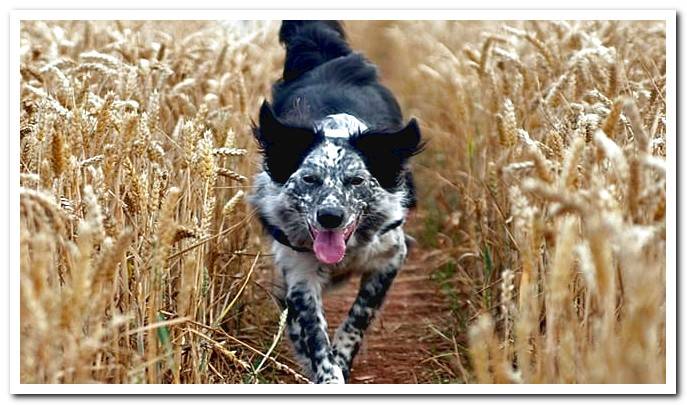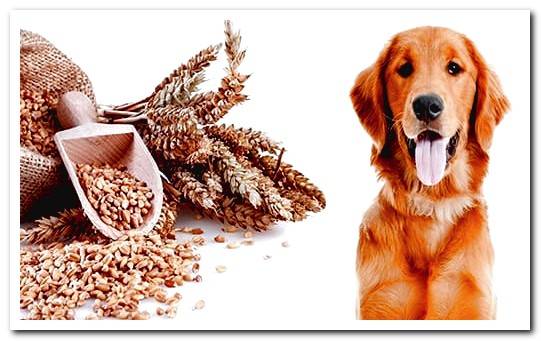
Celiac dogs are those that do not tolerate gluten, a protein found in flours and other foods that can be part of the canine diet. This pathology has an important genetic component and its detection is key to prevent our dog friends from developing a chronic disease.
From Dogsis we will discover what are the most obvious symptoms of canine celiac disease, the dog breeds most prone to gluten intolerance and what to do if a dog is confirmed to be celiac. Do you want to know all the details now? Well, let’s not wait any longer.
You may also like: Natural diets for dogs with intolerances
Index of contents
- 1 Symptoms presented by celiac dogs
- 2 Diagnosis and treatment of a gluten intolerant dog
- 3 Dog breeds more prone to gluten intolerance
- 4 What is the treatment for celiac dogs?
Symptoms presented by celiac dogs
To know if our dog is celiac the first thing we must do is look at some symptoms that can serve as the first warning sign. Some of the most common are:
- The dog has poor quality, lackluster hair.
- You have weight loss and lack of appetite.
- You have digestive problems, such as vomiting or diarrhea after eating.
These three symptoms are due to internal malnutrition caused by gluten intolerance in the dog. This condition damages your intestinal villi and prevents you from properly absorbing essential nutrients such as vitamins, minerals, or proteins that you need to be healthy.

In addition, other symptoms that celiac dogs can also present are:
- Itchy skin and anus. Consequently, the dog licks a lot for having dry and irritated skin or drags its behind on the ground to relieve itself.
- He is tired, unwilling to play and apathetic.
- Stomach pain from gluten intolerance.
- Respiratory problems. The throat and nostrils of the dog with a gluten allergy can become inflamed, causing itching, sneezing, and breathing problems.
In the most serious cases the dog may experience a seizure episode after consuming a gluten-containing food. If this happens, you should urgently take him to a veterinaryn so that he can attend to him and stabilize him.
If you have not reached that point but do have some of the signs that we have described, you should also take him to a specialist as soon as possible so that he can perform a series of tests that will confirm or rule out the diagnosis.
Diagnosis and treatment of a gluten intolerant dog
During the consultation you must describe to the vet all the symptoms that you have been able to detect in the dog. Then the specialist will make a touch in the stomach area to see if your internal organs may be affected.
To find out if a dog is celiac, several tests are also done, such as blood, urine and feces tests. The vet may want to additionally perform an abdominal x-ray or exocrine pancreatic insufficiency test.
Some specialists recommend a trial period with a gluten-free diet for a month, to see if the dog responds well to this change in diet. If after this time you see that the dog consumes food with gluten and relapses, surely there is no doubt that it is a celiac disease problem.

Dog breeds more prone to gluten intolerance
As we have already advanced, there is an important genetic component that makes some breeds of dogs more prone to gluten intolerance than others, a condition that manifests itself since dogs are young.
Although this pathology can affect any dog, the truth is that there are usually more celiac dogs among the breeds:
- Irish setter
- Samoyed
Therefore, when adopting a dog of these breeds, it is convenient to take it into account and be attentive to how it responds to the food you give it.
What is the treatment for celiac dogs?
When a dog is diagnosed as celiac, treatment involves changing its diet and adapting it so that it has a completely gluten-free diet. The vet will be able to recommend the most suitable feed for your furry friend.
From that moment on, when you buy food for him, you should pay close attention to all the ingredients. You should avoid any product that contains gluten, such as cans or other types of food preparations with grains or traces of cereals such as wheat, rye, oats or barley.
An incorrect diet could aggravate your condition and cause conditions such as chronic inflammatory disease of the small intestine in dogs. Therefore, take good care of your diet and look, even, in the composition of the awards and treats that you give.
If you’re in contact with other dogs or going to another visiting house, make sure he stays away from gluten-free foods. It is important that all family members and friends know how this condition affects them, because with the proper diet the dog will be able to live healthy and happy for much longer.
